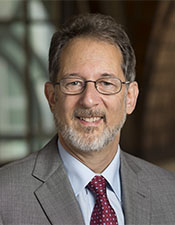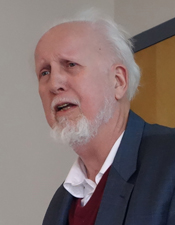Carnegie Mellon Philosophy Department Partners With Pitt To Maximize Data Science for Biomedical Research
New Center for Causal Modeling and Discovery Supported By Four-Year, $11 Million Grant From National Institutes of Health
Contact: Shilo Rea / 412-268-6094 / shilo@cmu.edu
PITTSBURGH—If used correctly, "big data" and data science have enormous potential to revolutionize many fields. To maximize its benefits for biomedical research, Carnegie Mellon University's Department of Philosophy is partnering with the University of Pittsburgh to form a new Center for Causal Modeling and Discovery in the Biomedical Sciences.
Funded by a four-year, $11 million grant from the National Institutes of Health (NIH), this Big Data to Knowledge Center of Excellence will help scientists capitalize more fully on enormous and growing collections of data, and to make computerized searches for causal relations a more prominent component of biomedical research.
Gregory Cooper, professor and vice chair of the Department of Biomedical Informatics at the Pitt School of Medicine and director of the new Center for Causal Modeling and Discovery, said much of science focuses on understanding the "why" or "how" in nature, and now the challenge is to find these answers within terabytes and petabytes of data, or what is now known as "Big Data."
 "Individual biomedical researchers now have the technology to generate an enormous quantity and diversity of data. Adequately analyzing these data to discover new biomedical knowledge remains a major challenge, however," Cooper said. "Our goal is to make it much easier for researchers to analyze big data to discover causal relationships in biomedicine."
"Individual biomedical researchers now have the technology to generate an enormous quantity and diversity of data. Adequately analyzing these data to discover new biomedical knowledge remains a major challenge, however," Cooper said. "Our goal is to make it much easier for researchers to analyze big data to discover causal relationships in biomedicine."
Through the new center, Carnegie Mellon philosophy faculty members will join an elite team, including researchers from the Pittsburgh Supercomputing Center, Yale University, Rutgers University and other national and international collaborators, to develop and disseminate tools that can find causal links in very large and complex biomedical data.
"This grant is devoted to extending and applying computational causal discovery methods, developed primarily in the CMU Philosophy Department, to biomedical data concerning cancer and lung disease. It's very exciting that our faculty will have the opportunity to take a lead role in algorithm development and training within the new center," said Richard Scheines (above, right), dean of CMU's Dietrich College of Humanities and Social Sciences and professor of philosophy who will be working on providing training and educational software for investigators who wish to use the methods on their own scientific problems.
 CMU's Clark Glymour (right), the Alumni University Professor of Philosophy, and Nicholas Nystrom, director of strategic applications at the Pittsburgh Supercomputing Center, will lead teams that will develop and implement causal modeling and discovery algorithms to support the data analyses of three separate investigations, each focusing on distinct biomedical problems whose answers lie in a sea of data: cell signals that drive the development of cancer; the molecular basis of lung disease susceptibility and severity; and the functional connections within the human brain (the "connectome").
CMU's Clark Glymour (right), the Alumni University Professor of Philosophy, and Nicholas Nystrom, director of strategic applications at the Pittsburgh Supercomputing Center, will lead teams that will develop and implement causal modeling and discovery algorithms to support the data analyses of three separate investigations, each focusing on distinct biomedical problems whose answers lie in a sea of data: cell signals that drive the development of cancer; the molecular basis of lung disease susceptibility and severity; and the functional connections within the human brain (the "connectome").
Each project will act as a test bed for the development, rigorous testing and refinement of analytic tools. When successful, these algorithms and software can likely be applied to other biomedical research questions. The center will provide free, open-source software that scientists all over the world can use with their own datasets to uncover causal biomedical relationships. Their feedback will further enhance the algorithms and software.
"Despite applications in climate science, economics, planetary science, epidemiology, genomics and many other subjects, the very idea of computerized aids for causal inference has been controversial. With this award, it should be less so," said Glymour, who with Cooper is a principal investigator on the project. "The center will not only enable progress on important biomedical problems, it will help to expand the use of novel methodologies that are essential for scientific discovery in the era of big data."
Additional CMU philosophers working under the new center include David Danks, head of the Department of Philosophy, Peter Spirtes, professor of philosophy, and Joseph Ramsey, director of research computing for the Laboratory for Symbolic Computation and Education. Other collaborators include the California Institute of Technology, University of Crete, Stanford University and the University of North Carolina.
###
CMU's Richard Scheines (top photo) will be working on providing training and educational software for investigators who wish to use the computational causal discovery methods on their own scientific problems.
CMU's Clark Glymour (above) said the center will enable progress on important biomedical problems, and expand the use of novel methodologies that are essential for scientific discovery in the era of big data.